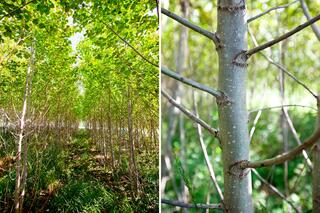Poplar root-associated microbial communities are influenced by soil and plant genotype

Soil origin is a significant factor in driving the composition of fungal and bacterial communities.
The Science
The root-associated microbiome, made up of communities of fungi and bacteria, is essential for plant health and performance. This plant “rhizobiome” is influenced by soil and environmental conditions, plant species, and plant genotype, but it is difficult to disentangle these effects from each other in natural systems. In a study published in Frontiers in Microbiology, researchers at the Great Lakes Bioenergy Research Center (GLBRC) were able to determine and separate the impacts of plant genotype and soil properties on the fungal and bacterial community in the Populus (poplar) rhizobiome.
The Impact
The microbes that make up the plant rhizobiome play an important role in plant health and nutrition. Understanding how soil properties and plant genotype affect this microbial community could offer new approaches for managing plant microbiomes for health and sustainability. This study lays a foundation for understanding multi-Kingdom microbial interactions within plant rhizobiomes and provides a framework for expanding research in this area from mesocosms to the field.
Summary
Common garden “trap plant” experiments were used to disentangle the effects of host genotype and soil origin on the networks of fungal and bacterial communities found in the microbiome of Populus deltoids (poplar). In this study, two experiments were conducted. The first evaluated the effect of poplar genotype on the root microbiome by growing four genotypes in a common soil. The second determined the impact of soil origin on the root microbiome by growing one poplar genotype in eight different soils. Soil geographic origin and physiochemical characteristics (specifically, texture and calcium concentration) explained most of the measurable variation in fungal and bacterial communities and bipartite networks. The impact of poplar genotype was stronger for bacteria than fungi, and was dependent upon the specific soil the plants were grown in. Network analyses of the large datasets helped identify microbial taxa that correlated with particular plant genotypes, soils, and soil characteristics, as well as fungal-bacterial consortia that were statistically overrepresented in the dataset, providing hypotheses for testing and a framework for expanding this research to field studies.
Program Manager
N. Kent Peters
kent.peters@science.doe.gov, 301-903-5549
Corresponding Author
Gregory Bonito
bonito@msu.edu, 517-884-6958
Funding
This work was supported by the Genomic Science Program, U.S. Department of Energy (DOE), Office of Science – Biological and Environmental Research as part of the Plant Microbe Interfaces Scientific Focus Area at Oak Ridge National Laboratory (ORNL). ORNL is managed by UT-Battelle, LLC, for DOE under contract DE-AC05-00OR22725. The work was also supported by the Michigan State University AgBioResearch project (MICL02416), the USDA National Institute of Food and Agriculture (MICL08541), the National Science Foundation (DEB-1441728), and the DOE Great Lakes Bioenergy Research Center (DOE BER Office of Science DE-SC0018409).
Publications
Bonito, G., et al. “Fungal-bacterial networks in the Populus rhizobiome are impacted by soil properties and host genotype.” Frontiers in Microbiology 10, 481 (2019), DOI: 10.3389/fmicb.2019.00481
Related Links
https://www.frontiersin.org/articles/10.3389/fmicb.2019.00481/full